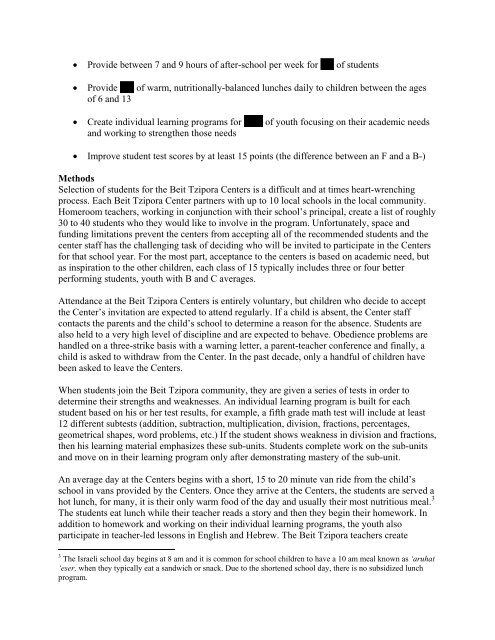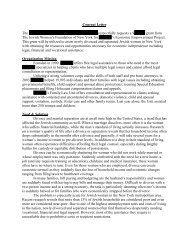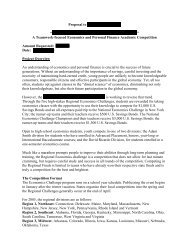The Elie Wiesel Foundation for Humanity Proposal to FOUNDATION ...
The Elie Wiesel Foundation for Humanity Proposal to FOUNDATION ...
The Elie Wiesel Foundation for Humanity Proposal to FOUNDATION ...
You also want an ePaper? Increase the reach of your titles
YUMPU automatically turns print PDFs into web optimized ePapers that Google loves.
• Provide between 7 and 9 hours of after-school per week <strong>for</strong> NR of students<br />
• Provide NU of warm, nutritionally-balanced lunches daily <strong>to</strong> children between the ages<br />
of 6 and 13<br />
• Create individual learning programs <strong>for</strong> BER of youth focusing on their academic needs<br />
and working <strong>to</strong> strengthen those needs<br />
• Improve student test scores by at least 15 points (the difference between an F and a B-)<br />
Methods<br />
Selection of students <strong>for</strong> the Beit Tzipora Centers is a difficult and at times heart-wrenching<br />
process. Each Beit Tzipora Center partners with up <strong>to</strong> 10 local schools in the local community.<br />
Homeroom teachers, working in conjunction with their school’s principal, create a list of roughly<br />
30 <strong>to</strong> 40 students who they would like <strong>to</strong> involve in the program. Un<strong>for</strong>tunately, space and<br />
funding limitations prevent the centers from accepting all of the recommended students and the<br />
center staff has the challenging task of deciding who will be invited <strong>to</strong> participate in the Centers<br />
<strong>for</strong> that school year. For the most part, acceptance <strong>to</strong> the centers is based on academic need, but<br />
as inspiration <strong>to</strong> the other children, each class of 15 typically includes three or four better<br />
per<strong>for</strong>ming students, youth with B and C averages.<br />
Attendance at the Beit Tzipora Centers is entirely voluntary, but children who decide <strong>to</strong> accept<br />
the Center’s invitation are expected <strong>to</strong> attend regularly. If a child is absent, the Center staff<br />
contacts the parents and the child’s school <strong>to</strong> determine a reason <strong>for</strong> the absence. Students are<br />
also held <strong>to</strong> a very high level of discipline and are expected <strong>to</strong> behave. Obedience problems are<br />
handled on a three-strike basis with a warning letter, a parent-teacher conference and finally, a<br />
child is asked <strong>to</strong> withdraw from the Center. In the past decade, only a handful of children have<br />
been asked <strong>to</strong> leave the Centers.<br />
When students join the Beit Tzipora community, they are given a series of tests in order <strong>to</strong><br />
determine their strengths and weaknesses. An individual learning program is built <strong>for</strong> each<br />
student based on his or her test results, <strong>for</strong> example, a fifth grade math test will include at least<br />
12 different subtests (addition, subtraction, multiplication, division, fractions, percentages,<br />
geometrical shapes, word problems, etc.) If the student shows weakness in division and fractions,<br />
then his learning material emphasizes these sub-units. Students complete work on the sub-units<br />
and move on in their learning program only after demonstrating mastery of the sub-unit.<br />
An average day at the Centers begins with a short, 15 <strong>to</strong> 20 minute van ride from the child’s<br />
school in vans provided by the Centers. Once they arrive at the Centers, the students are served a<br />
hot lunch, <strong>for</strong> many, it is their only warm food of the day and usually their most nutritious meal. 3<br />
<strong>The</strong> students eat lunch while their teacher reads a s<strong>to</strong>ry and then they begin their homework. In<br />
addition <strong>to</strong> homework and working on their individual learning programs, the youth also<br />
participate in teacher-led lessons in English and Hebrew. <strong>The</strong> Beit Tzipora teachers create<br />
3 <strong>The</strong> Israeli school day begins at 8 am and it is common <strong>for</strong> school children <strong>to</strong> have a 10 am meal known as ‘aruhat<br />
‘eser, when they typically eat a sandwich or snack. Due <strong>to</strong> the shortened school day, there is no subsidized lunch<br />
program.




